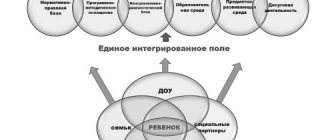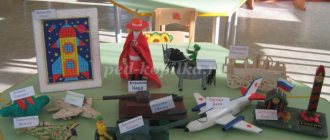Interaction between a speech therapist and parents in the process of correctional and speech therapy work with a child
In accordance with the Law of the Russian Federation “On Education”, the most important task of a teacher is interaction with the family to ensure the full development of the child.
The success of the correctional and educational activities of a speech therapist largely depends on the active and qualified participation of parents in the process of speech correction, in the upbringing and education of the child. A child with speech impairments must be dealt with not only in educational and correctional institutions, but also at home, in the family circle - in the primary, most important and authoritative unit of society for a little person, if possible involving all family members in the correction process.
However, even the most active and loving parents, as a rule, do not have the necessary pedagogical knowledge and skills, and, as a result, do not devote sufficient time and attention to a child with speech impairments, or completely distance themselves from the problem, placing it mostly on specialists. No less harmful are also erroneous methods of home correction, applied by parents with the best intentions, but without the proper correctional, pedagogical and psychological qualifications.
Thus, the initiative to form such cooperation should come from the speech therapist teacher. The list of tasks is quite wide: it is necessary to create a comfortable and trusting general educational environment; clearly and comprehensively explain to parents the importance and methodology of speech correction; achieve active and proper participation of parents in raising a child; explain the need to consolidate the successes achieved in the classroom; provide the necessary pedagogical tools for these purposes and provide means of communication.
All families are different, and the approach in each individual case must be tailored individually. In cases where parents try to put all the work on specialists, it is necessary to carry out serious educational work and properly motivate them to work painstakingly together with the speech therapist and the child. If parents are overly active, they should make it clear that for the correction of speech development, calm and consistent work is much more important and effective than inflated expectations and dizziness from possible momentary successes. In cases where parents are not so seriously concerned about the child’s speech problems in the hope that they will “correct themselves,” the specialist must not only explain the importance of correctional work, but also constantly remind, encourage and be interested in the child’s success in homework. If the family is dysfunctional and the parents are quite indifferent, the teacher will have to take on the main work himself and/or find alternative methods of influencing the situation. There are no universal recipes for each specific case, and each time a speech therapist teacher has to not only teach, but also learn himself.
However, there are universal pedagogical techniques and methods that greatly facilitate the tasks of a speech therapist. Such techniques and methods can be divided into four types: collective, individual, visual information and unifying.
Collective methods:
- Parent meetings;
- Seminars and workshops (trainings);
- Round tables.
Individual methods:
- Questionnaire;
- Interviews;
- Consultations;
- Homework notebooks;
- Weekly summary statements.
Visual methods:
- Booklets, information sheets and newspapers;
- Open classes;
- Speech therapy library;
- Websites, presentations, interactive computer programs.
Unifying methods: joint preparation and participation of parents and children in holidays, performances, games and entertainment.
The most important tool for building equal cooperation between specialists and parents is parent meetings. At the first meetings, parents receive primary information about the structure of this institution, about the rules and regulations, about the goals and objectives of specialists, about the dynamics of past courses, etc. Video materials demonstrating the successful work of speech therapists, neuropsychologists and others can serve as a very good help in this case. specialists. In addition, such meetings also serve as a bonding tool, transforming previously unfamiliar individuals into a team united by common goals, aspirations and tasks. The specialist is obliged to convey the immense importance of shared responsibility for the future of each child and identify methods for solving problems, both for the speech therapist and for parents acting as teachers.
Subsequent parent meetings should be held under the motto “Our children are great!” (positive dynamics). Under no circumstances should you publicly praise some children and their parents and identify problems with others, risking losing the psychological contact that has been established with such difficulty. All existing problems must be moved from the collective level to the individual level.
The timing of parent meetings should be designed in such a way that there is enough time for questions and answers. Questions arise for every parent, but due to individual characteristics, not all parents ask them. As practice shows, questions, with rare exceptions, are generally quite stereotypical, so that everyone, both more active parents and less active ones, receives answers to exciting topics.
Seminars and workshops serve, first of all, to help parents organize and conduct speech therapy classes with their families. Here parents learn how to properly use homework notebooks. Here they receive organizational, speech therapy and psychological knowledge and skills, learn to use a variety of articulatory gymnastics exercises, techniques for developing fine motor skills, attention, thinking, perseverance, etc. Each seminar must be extremely specific, aimed at solving currently relevant correctional and pedagogical tasks. Each seminar should be supported by practical demonstrations and practice of correctional work techniques, visual aids, information sheets and brochures.
Round tables contribute to even greater growth of horizontal connections between the pedagogical and parental environment. Unlike the seminar, whose motto is “Practice, and practice again,” the round table serves to improve the pedagogical culture of parents. To provide a theoretical basis for pedagogical, psychological and correctional work with children, round tables can be held both in any institution and within the family circle. It is necessary to involve as many specialists as possible - speech therapists, psychologists, doctors, administrative workers - in round tables with parents. The round table agenda consists of several reports on topics of concern to parents, with explanations and additions from other specialists. After the presentations, they are widely discussed in the form of an exchange of opinions. It must be remembered that the round table format implies benevolent but strict moderation, which does not allow the interlocutors to go far beyond the scope of the designated discussion for justifiable fear of losing the structure of the event and moving away from its goals and objectives.
It is necessary to begin building fruitful relationships with parents already at the stage of collecting a primary anamnesis, from interviews and questionnaires. It is important to get to know each family as closely as possible, create an atmosphere of mutual trust, show the need and prove sincere interest in the child’s full speech development. To do this, you will have to take into account the individual characteristics of each family: its composition, cultural level, living conditions, the degree of employment of each family member, the level of activity of the parents and the level of readiness to enter into confidential cooperation with a speech therapist. Moreover, at the acquaintance stage, it is very rational to use an integrated approach: using data obtained not only from face-to-face and correspondence communication between a speech therapist and parents, but also data obtained from parents’ communication with a psychologist and doctors, etc.
After the initial interview, individual consultations are conducted. Most often, they are required by parents whose children have difficulty improving the quality of speech, require medication intervention and supervision by other specialists. As part of such consultations, the child’s further correctional route is considered in detail in each specific case.
Homework notebooks are the main tool through which parents receive a timely set of games and exercises to consolidate the skills, knowledge and abilities acquired in speech therapy classes, as well as specific methodological recommendations for performing these particular exercises. It is advisable to replace traditional ordinary “school” notebooks, which are filled out by parents on the basis of cards with homework, with small folders with empty files attached to them. It is convenient to insert large-format disposable cards into such a file, with fields already prepared for solutions. In addition, the notebook can and should be used as the main means of operational communication between specialists and the child’s family. Each task should be accompanied by a special field in which parents can leave their notes, questions, concerns and wishes, and the speech therapist can leave their answers and comments. Practice shows that such interactivity most contributes to the involvement of parents in the educational and correctional pedagogical process, and extremely clearly and effectively forms close, trusting relationships between parents and teachers.
Information sheets are distributed to parents after parent-teacher meetings, seminars and scheduled consultations. Their task is to specify the topics, goals and methods of conducting speech therapy classes raised at meetings and discussions; they also describe the tools necessary for successful work with the child and announce recommendations on the schedule and routine of homework. In addition, information sheets serve as an invitation to parents for speech therapy sessions.
Parents should have free access to frontal and personal classes in preschool educational institutions. In such open classes, adults can visually familiarize themselves with the techniques and methods of correctional work for their subsequent application at home, learn the correct combinatorics for performing target speech work and the development of higher mental processes important for the child’s adaptation in society. It is not at all necessary for parents to remain passive observers of open classes; it is very useful to include them in the pedagogical process as equal participants. In this way, parents undergo speech therapy practice, gain an understanding of the correct reactions to the child’s successes and problems, and at the same time become liberated and establish real-life contacts with children and specialists.
An extremely useful aid in general correctional activities is the speech therapy library and game library available to every parent. It is important to collect in it not only specialized literature, not only all manuals used for activities and games at home, interesting articles and books, but also original teaching materials and tools created by teachers and parents, audio-video documents, and children’s works. A speech therapist should always be ready to offer parents the materials and tools that are necessary for the more effective development of their child.
We should not lose sight of modern information technologies. Timely computer presentations are ideal for meetings, seminars, workshops and round tables. Short but colorful gaming and educational presentations serve as an excellent tool for keeping a child’s attention in group and individual lessons. A lot of useful information for parents can be posted both on the official website of the institution and on social networks. In the same networks, it is extremely convenient to duplicate current stand information, give announcements of events and invite parents to them. E-mail correspondence and the speech therapist’s information feed in the “question-answer” format also help to establish a unified pedagogical-family environment.
Another, no less important method of interaction between a speech therapist and parents in the process of correctional and speech therapy work with a child, which needs to be paid close attention to, is joint participation in the preparation and implementation of speech projects: themed matinees, holidays, art exhibitions and other entertainment that demonstrate the child’s progress as a result of joint correctional work. Participation in such creative activities is a powerful factor in stimulating cooperation, trust and shared responsibility among parents and professionals. In other words, perfect team building.
It is quite obvious that only equal cooperation between a speech therapist, psychologists, health workers and parents is the most important condition for successful correctional work with children to correct speech deficiencies that have a direct negative impact on the mental and moral development of the younger generation. Moreover, it is necessary to make the child himself an equal participant in such cooperation.
Literature:
- Law of the Russian Federation “On Education”, M., 2008.
- Bachina O. V., Samorodova L. N. Interaction between a speech therapist and the family of a child with speech impairments. M., 2009.
- Weiss M.N., Pustyakova T.V. Partnership between preschool educational institutions and families in speech therapy work // Speech therapist. 2010. No. 3.
- Vakulenko L. S. Organization of interaction between teacher, speech therapist and family. St. Petersburg 2011.
- Mastyukova E. M., Moskovkina A. G. Family education of children with developmental disabilities Proc. aid for students higher textbook institutions / Ed. V. I. Seliverstova. — M.: Humanite. ed. VLADOS center, 2003.
- Doronova T.N. et al. Preschool institutions and family - a single space for child development. M., 2001.
- Sagdeeva N.V. Joint activities of parents with children in the preschool educational institution “Step towards” Detstvo-Press, 2012.
- Shashkina G.R. et al. Speech therapy work with preschoolers: Textbook. aid for students higher ped. textbook establishments. - M.: Publishing House, 2003.
Areas of joint activity
- establishing partnerships and creating an atmosphere of mutual support;
- formation of a motivated attitude of parents towards correctional activities;
- selection and implementation of various variable forms of interaction;
- increasing the psychological and pedagogical competence of parents in matters of child speech development;
- providing practical assistance to parents, supporting their confidence in their own pedagogical capabilities;
- training parents in specific speech therapy techniques



